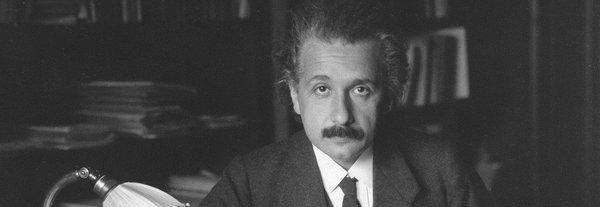
Common domain images | Wikipedia
In 1946, he stood up to condemn the oppression of black people in the United States:
"In the United States, people of color are isolated from white people, and this separation is not because of the problem of people of color, but because white people have problems, and I am not going to be silent about this." He said in a speech at lincoln university graduation in Pennsylvania.
As a Jewish scientist who experienced anti-Semitism in Germany, Einstein showed deep sympathy for the plight of black Americans.
After the rise of the Nazis, he left Germany and lived in Princeton, New Jersey, where he often took a walk in his free time in segregated black neighborhoods.
He sat on people's porches, chatting with them and giving candy to their children and grandchildren.
Einstein was so closely linked to the civil rights movement in the United States that the FBI put him under surveillance, and until his death was unknown, the FBI's archives for Einstein were about 1,500 pages.
But Einstein has another side that is not known.
During his months-long travels in the 1920s, he recorded his views on the inhabitants of East Asian states in his private diary. In that private time, the Nobel laureate in physics made stereotypical dehumanizing evaluations of Chinese and Indians.
Perhaps, even people like Einstein, in the face of unfamiliar groups, still have difficulty completely abandoning racist ideas.
Princeton University Press recently published the travel diaries of albert einstein. Editor Rosenkranz said the contradiction made Einstein more human.
"I'm not going to apologize for him, I still find these unpleasant remarks shocking, but they just show that people are not sages and that everyone has a dark side." He said.
The diary lasted from October 1922 until March 1923, when he and his wife Elsa sailed to the Mediterranean, Sri Lanka, China and Japan.
Every day, he paints a picture of his surroundings, sometimes in a hurry, sometimes in combination: "At night, the wonderful sunset is purple, and the wind blows through the clouds, revealing a tiny illuminated gap...".
He recorded the people he met, as well as his observations and thoughts about them, and summarized "their personalities and traits, but a few, often humorous or disrespectful words," Rosenkranz writes in the book's foreword.
To the average Japanese, Einstein wrote, "No questions are asked, there is no human touch, they are happy and unreserved in performing their social functions, while taking great pride in their country and nation." Leaving Asia and entering Europe, abandoning traditional ways, has not diminished their national pride in the slightest. ”
Although Einstein thought about the male members of Japan relatively deeply, his view of Japanese women was more about their appearance than connotations.
Observing them on board, he wrote that the Japanese women "look gorgeous and confused ... Dark eyes, black hair, big heads, in a hurry. ”
His view of the Chinese at that time was even more cold, even insulting. Although he called Chinese "industrious," he also described them as "dirty" and "insensitive."
Einstein wrote that they belonged to "special taxa states" and "generally resembled machines more than humans."
He considered them mentally inferior, quoting a Portuguese teacher he met during his travels — Chinese "unable to undergo training in logical thinking" and "without mathematical talent."
Rosenkranz argues that Einstein had an "aversion tendency":
"I noticed that the difference between men and women was small; I didn't understand what kind of fatal attraction Chinese women had that made it impossible for local men to resist the instinct to produce offspring."
"It would be a pity if these Chinese replaced all other races." He wrote, "For those of us who think simply, it is indescribably dull. ”
In Colombo, Sri Lanka, he expressed sympathy for street beggars. He said he knew that what he did would further increase the unequal treatment faced by humanity and was ashamed of it. However, they are indeed inferior people at the mercy of fate...
After a three-month trip to the United States, Hitler and the Nazi Party will take over the German government in another month. Einstein did not return home and decided to stay in the United States, where he gained a deeper understanding of the plight faced by African Americans. He took a firm stand in the civil rights movement, signed an anti-lynching petition, and volunteered to stand on the court witness stand as a witness.
"Yes, he has become more just and enlightened." Rosenkranz said. But whether Einstein's racist views, particularly about Chinese, have changed, Rosenkranz isn't sure.
All of this suggests that our past perceptions of Einstein ignored his complexity as a human being: "With regard to the statements he made and the elements of his character, we should point out that they were contradictions of human nature itself. On the one hand, he was very generous and very moral... But there are also misguided statements that should not be ignored. ”
Regarding human nature, we are complex creatures with both good expectations and dark faiths. They may not be expressed publicly, but the secrets we may hide give us the opportunity to see ourselves.
This article is translated from sciencealert and published by translator Majer under the Creative Commons License (by-nc).